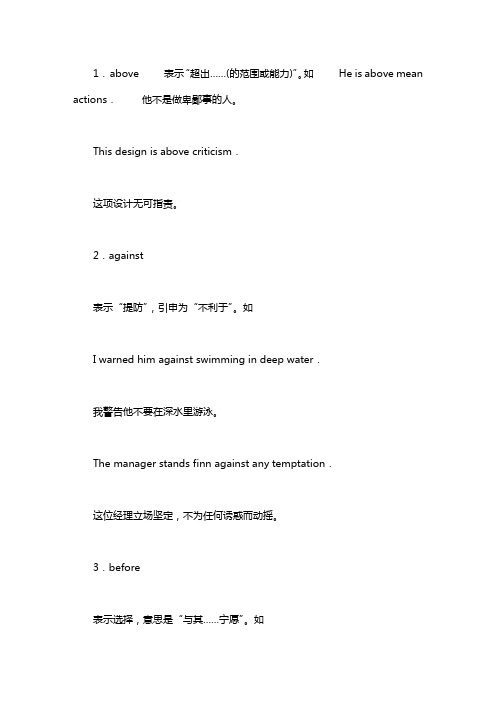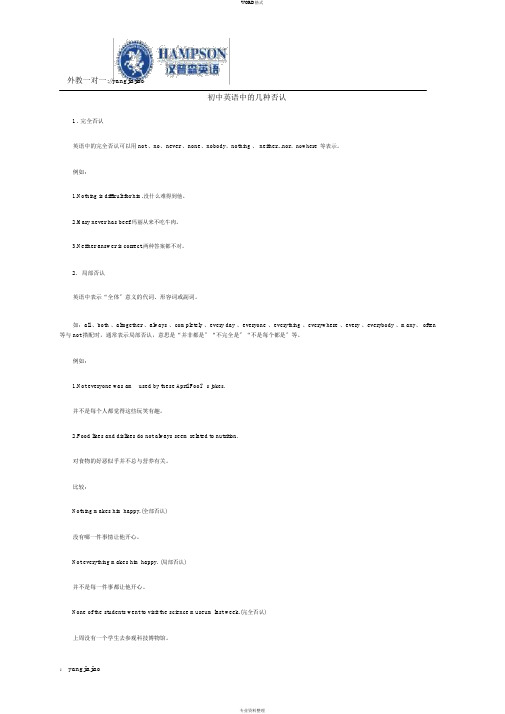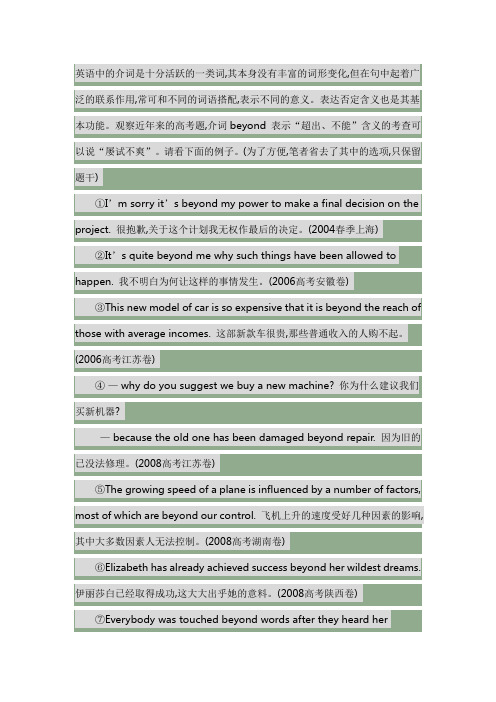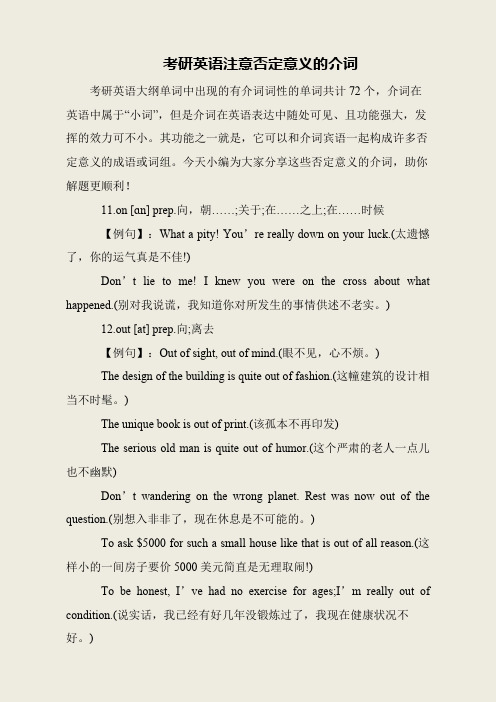否定意义的介词短语 含否定意义的介词大盘点
- 格式:doc
- 大小:30.00 KB
- 文档页数:9


1.above 表示“超出……(的范围或能力)”。
如He is above mean actions.他不是做卑鄙事的人。
This design is above criticism.这项设计无可指责。
2.against表示“提防”,引申为“不利于”。
如I warned him against swimming in deep water.我警告他不要在深水里游泳。
The manager stands finn against any temptation.这位经理立场坚定,不为任何诱惑而动摇。
3.before表示选择,意思是“与其……宁愿”。
如He"d choose death before dishonour.他宁死而不受辱。
4.behind表示“落后于”、“不如”。
如She is behind the rest of her class in chemistry.他化学不如班上其他同学。
5.below表示位置、职务、数量、价值等,意为“低于”。
如This trifling ma~er is below OUT notice.这件小事不值得我们注意。
6.beneath表示“低于”、“小于”、“差于”、“次于”。
如The would-be novelist"s works are beneath notice.这位自封的小说家的作品不值一看。
It is beneath you to argue with him.你犯不上同他辩论。
7.beside表示“在……之外”、“与……无关”。
如This argument is beside the question we are considering.这种论点同我们正在研究的问题无关。
8.beyond表示“超越”、“越出”。
如The beauty of the West Lake is beyond description.西湖之美无法描绘。

否定前缀用法总结否定前缀是一种语法上的修饰词缀,用于给动词、形容词、副词、名词等加上否定的含义。
在英语中,否定前缀可以帮助我们表达否定的意思,使句子更加明确和准确。
本文将对几个常用的否定前缀进行总结,包括un-,dis-,in-,im-,il-,ir-,non-等,并对它们的用法和例子进行详细讨论。
首先,un-是最常用的否定前缀之一、它通常与形容词和动词一起使用,表示取消、逆转或否定。
例如,unhappy(不快乐的),unfair(不公平的),undo(撤销),这些词都使用了un-前缀。
在这些例子中,un-前缀改变了词的含义,从积极变为消极或否定。
其次,dis-也是常见的否定前缀。
它的含义是“否定、分开或取消”。
例如,disagree(不同意),disconnect(断开),disapprove(不赞同)等。
dis-前缀强调了否定的含义,转变了词的本意。
接下来,in-和im-也是两个常用的否定前缀。
它们的含义都是“不、没有、否定”。
例如,invisible(不可见的),impossible(不可能的),incapable(无能力的)等。
这些词由于加了否定前缀,表示了否定的含义,从而转变了它们的词义。
另外,il-和ir-也是两个常见的否定前缀。
它们的含义分别是“不、非”和“不、无”。
例如,illegal(非法的),irregular(不规则的),这些词都含有否定的概念,传达了它们不正常或不合法的意思。
此外,non-是一个万能的否定前缀,它的含义是“不、非、无”。
非常常见的一些词如nonstop(不停的),nonfiction(非小说的),none (没有的)等,这些词都表示了否定或不可用的含义。
需要注意的是,否定前缀有时会改变词的拼写或发音。
例如,im-和前面的辅音有关系时,im-会变成il-。
比如,impossible(不可能的)变成了illogical(不合逻辑的)。
类似的情况也出现在in-前缀上,当in-和前面的辅音有关系时,in-会变成ir-,例如incorrect(不正确的)。

外教一对一://yangjiajiao初中英语中的几种否认1 . 完全否认英语中的完全否认可以用not 、no、never 、none、nobody、nothing 、 neither...nor、nowhere等表示。
例如:1.Nothing is difficult for him.没什么难得到他。
2.Mary never has beef.玛丽从来不吃牛肉。
3.Neither answer is correct.两种答案都不对。
2.局部否认英语中表示“全体〞意义的代词、形容词或副词。
如:all 、both 、altogether 、always 、completely 、every day 、everyone 、everything 、everywhere 、every 、everybody 、many、 often 等与 not 搭配时,通常表示局部否认,意思是“并非都是〞“不完全是〞“不是每个都是〞等。
例如:1.Not everyone was am used by these April Fool’s jokes.并不是每个人都觉得这些玩笑有趣。
2.Food likes and dislikes do not always seem related to nutrition.对食物的好恶似乎并不总与营养有关。
比较:Nothing makes him happy.(全部否认)没有哪一件事情让他开心。
Not everything makes him happy. (局部否认)并不是每一件事都让他开心。
None of the students went to visit the science museum last week.(完全否认)上周没有一个学生去参观科技博物馆。
外教一对一://yangjiajiaoNot all of the students went to visit the science museum last week.(局部否认)上周并不是所有的学生都去参观了科技博物馆。

英语中的介词是十分活跃的一类词,其本身没有丰富的词形变化,但在句中起着广泛的联系作用,常可和不同的词语搭配,表示不同的意义。
表达否定含义也是其基本功能。
观察近年来的高考题,介词beyond 表示“超出、不能”含义的考查可以说“屡试不爽”。
请看下面的例子。
(为了方便,笔者省去了其中的选项,只保留题干)①I’m sorry it’s beyond my power to make a final decision on the project. 很抱歉,关于这个计划我无权作最后的决定。
(2004春季上海)②It’s quite beyond me why such things have been allowed to happen. 我不明白为何让这样的事情发生。
(2006高考安徽卷)③This new model of car is so expensive that it is beyond the reach of those with average incomes. 这部新款车很贵,那些普通收入的人购不起。
(2006高考江苏卷)④— why do you suggest we buy a new machine? 你为什么建议我们买新机器?— because the old one has been damaged beyond repair. 因为旧的已没法修理。
(2008高考江苏卷)⑤The growing speed of a plane is influenced by a number of factors, most of which are beyond our control. 飞机上升的速度受好几种因素的影响,其中大多数因素人无法控制。
(2008高考湖南卷)⑥Elizabeth has already achieved success beyond her wildest dreams. 伊丽莎白已经取得成功,这大大出乎她的意料。

考研英语注意否定意义的介词 考研英语大纲单词中出现的有介词词性的单词共计72个,介词在英语中属于“小词”,但是介词在英语表达中随处可见、且功能强大,发挥的效力可不小。
其功能之一就是,它可以和介词宾语一起构成许多否定意义的成语或词组。
今天小编为大家分享这些否定意义的介词,助你解题更顺利! 11.on [ɑn] prep.向,朝……;关于;在……之上;在……时候 【例句】:What a pity! You’re really down on your luck.(太遗憾了,你的运气真是不佳!) Don’t lie to me! I knew you were on the cross about what happened.(别对我说谎,我知道你对所发生的事情供述不老实。
) 12.out [at] prep.向;离去 【例句】:Out of sight, out of mind.(眼不见,心不烦。
) The design of the building is quite out of fashion.(这幢建筑的设计相当不时髦。
) The unique book is out of print.(该孤本不再印发) The serious old man is quite out of humor.(这个严肃的老人一点儿也不幽默) Don’t wandering on the wrong planet. Rest was now out of the question.(别想入非非了,现在休息是不可能的。
) To ask $5000 for such a small house like that is out of all reason.(这样小的一间房子要价5000美元简直是无理取闹!) To be honest, I’ve had no exercise for ages;I’m really out of condition.(说实话,我已经有好几年没锻炼过了,我现在健康状况不好。
外教一对一介词的否定意义总结介词在英语中属于“小词”,事实上介词在英语中发挥的效力可不小。
介词在英语中起着“螺丝钉”的作用,它随处可见,且功能强大。
其功能之一就是,它可以和介词宾语一起构成许多否定意义的成语或词组。
介词否定表达简捷明意义深刻,其译文多采用意译。
1. AboveThe text is above me. (无法理解)She thinks she is above criticism. (不容批评)His conduct has always been above suspicion. (无可置疑)I think a gentleman like him is above doing such a thing. (不屑于)2. AgainstAlmost everything was against him. (不利于)He’s always doing his best, agains t all odds. (不计成败)3. AtThe point is to win at any cost. (不惜一切代价)At any rate, we’ve done something for you now. (不管怎样)On the spot he was completely at sea. (不知所措)4. BehindThe train is running behind time. (不准时)Your ideas are all behind the times. (跟不上时代)5. BetweenThe secret is between ourselves. (不得外传)6. BeforeBefore long he realized that he was wrong. (不久)I slipped out before the lecture began. (不等)外教一对一The guerrillas (游击队员) would fight to death before they surrendered. (决不)7. BeneathLying is beneath him. (不合身分)Such a fellow as that is beneath my notice. (不值一理)8. BesideWhat you said is quite beside the point. (不关正题)9. BeyondThe news is beyond belief. (难以置信)The stars are beyond number. (数不清)The scene was beyond description. (无法形容)Good advice is beyond price. (无价)The facts are beyond dispute. (毋庸置疑)My happiness was beyond words. (难以言表)Doing such a thing is quite beyond my power. (无能为力)与beyond 构成的短语还有:beyond (any) doubt 无疑;beyond all praise 赞美不完;beyond comparison 无与伦比;beyond control 无法控制;beyond expression无法表达;beyond hope 无望;beyond question 无可争辩。
英语中肯定形式表否定意义的几种表达英语中表否定的方式有很多,除了使用绝对否定词表达否定以外,还可以通过单词、词组、句型和特定的句子等形式来表示相对的含蓄否定,这样既可以避免否定词的重复使用,也能使否定语气缓和而富有感情。
笔者把一些常见的肯定形式表否定意义的表达法总结归纳如下。
一、表示含蓄否定的单词1. 名词, 如absence,failure,lack,refusal等。
His absence of mind during the driving nearly caused an accident. 他开车时心不在焉,差点酿成交通事故。
He was upset by his failure in the exam. 他因考试不及格而感到沮丧。
2. 动词,如avoid,escape,miss,stop等。
She braked suddenly and avoided an accident. 她紧急刹车,从而避免了一场车祸。
The pin escaped my eyes. 我没有看见那根针。
3. 形容词,如different,ill,poor,wrong等。
Lily and Lucy are quite different even though they are twins. 莉莉和露西尽管是双胞胎,但却很是不一样。
He is in ill health. 他身体不好。
4. 介词,如above,beyond,instead of,out of等。
The novel is above me. 这本小说我看不懂。
The progress of the reform and open in every respect in China is indeed beyond belief. 中国在改革开放方面取得的进展的确令人难以置信。
5. 连词,如before,or,unless等。
He was hit on the head and fainted before he could figure out what had happened. 他还不知道发生了什么,就被人打在头上,昏了。
中考初中英语八种否定句形式汇总完全否定英语中的完全否定可以用not,no,never,none,nobody,nothing,neither...nor,nowhere等表示。
如:1.Nothing is difficult for him. 没什么难得到他。
2.Mary never has beef. 玛丽从来不吃牛肉。
3.Neither answer is correct. 两种答案都不对。
2部分否定英语中表示“全体”意义的代词,形容词或副词。
如:all,both,altogether,always,completely,every day,everyone,everything,everywhere,every,everybody,many,often等与not搭配时,通常表示部分否定,意思是“并非都是”“不完全是”“不是每个都是”等。
例如:1.Not everyone was amused by these April Fool's jokes.并不是每个人都觉得这些玩笑有趣。
2.Food likes and dislikes do not always seem related to nutrition. 对食物的好恶似乎并不总与营养有关。
比较:Nothing makes him happy.(全部否定)没有哪一件事情让他开心。
Not everything makes him happy.(部分否定)并不是每一件事都让他开心。
None of the students went to visit the science museum last week.(完全否定)上周没有一个学生去参观科技博物馆。
Not all of the students went to visit the science museum last week.(部分否定)上周并不是所有的学生都去参观了科技博物馆。
另外,if 从句通常表示事实上的否定或者与事实相反的假设,尽管在翻译成汉语时仍然保持肯定句的形式,但却表达的是否定的含义。
If you had come to my place, I would have told you about it.如果你那时到我这儿来,我是会告诉你的。
(这句话表示事实上的否定,意为“你没有到我这儿来,我也没有告诉你。
”It seemed as if he were trying to teach us all he knew in one class.看起来他好像想把自己所有的知识在一堂课内都教给我们。
(事实上,不可能将所有的知识在一堂课内教授)If only 与过去完成时连用时,表示同过去事实相反的主观设想,同样含有否定的意味,通常翻译成“要是……该多好啊”。
If only you had worked with great care! 你要是更仔细一些该多好啊! If only you had told me before. 要是你早告诉我就好了。
If only he hadn’t driven so fast.他没把车子开得这么快就好了。
8. 介词表示否定英语中介词的使用是相当活跃的,其中有些介词同样表达否定的意义,如from, off, of, in, without, for, above, beyond, past, out of, against, beside, 等等。
He is against the plan. 他反对这个计划。
He is out of work. 他失业了。
Good advice is above/ beyond/ without price. 好的建议是无价的。
This strange idea is beyond belief. 这种奇怪的想法令人难以置信。
I can see nothing without my glasses. 不戴眼镜我什么都看不见。
1.above 表示“超出……(的范围或能力)”。
如He is above mean actions.他不是做卑鄙事的人。
This design is above criticism.
这项设计无可指责。
2.against
表示“提防”,引申为“不利于”。
如
I warned him against swimming in deep water.
我警告他不要在深水里游泳。
The manager stands finn against any temptation.
这位经理立场坚定,不为任何诱惑而动摇。
3.before
表示选择,意思是“与其……宁愿”。
如
He"d choose death before dishonour.
他宁死而不受辱。
4.behind
表示“落后于”、“不如”。
如
She is behind the rest of her class in chemistry.他化学不如班上其他同学。
5.below
表示位置、职务、数量、价值等,意为“低于”。
如This trifling ma~er is below OUT notice.
这件小事不值得我们注意。
6.beneath
表示“低于”、“小于”、“差于”、“次于”。
如
The would-be novelist"s works are beneath notice.
这位自封的小说家的作品不值一看。
It is beneath you to argue with him.
你犯不上同他辩论。
7.beside
表示“在……之外”、“与……无关”。
如
This argument is beside the question we are considering.这种论点同我们正在研究的问题无关。
8.beyond
表示“超越”、“越出”。
如
The beauty of the West Lake is beyond description.
西湖之美无法描绘。
9.but
表示“除……以外”。
如
What is he but a doctor?
他不是医生是什么?
10.but for
表示“要不是”,“要是没有”,谓语多用虚拟语气。
如
But for his uncle"s help,Jack would not have finished his col-lege education in time.
要不是他叔父帮助,杰克是不会及时读完大学的。
11.except
表示“除……以外”。
如
He looked for his watch everywhere except his bedroom.他到处找手表,就是没有在卧室里找。
12.from
表示“脱离”、“阻止”、“免除”等。
如
A friend"s advice prevented him from making a blunder.由于一个朋友的忠告,他没有造成大错。
13.in spite of
表示“尽管”、“不顾”。
如
They kept on walking in spite of the rain.。